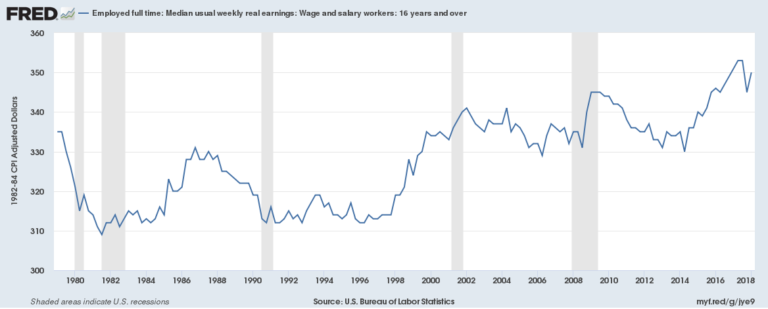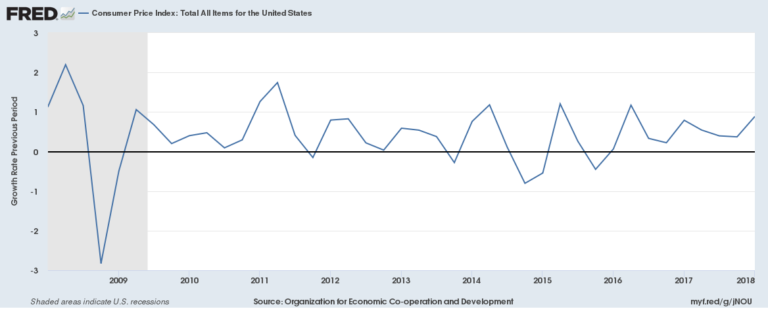The Economist wonders why wage growth isn’t increasing, even as unemployment falls. A naïve reading of supply and demand suggests that it should, so this has become a relatively common talking point in the news, with people of all persuasions scratching their heads. The Economist does it better than most. They at least talk about slowing productivity growth and rising oil prices, instead of blaming everything on workers (for failing to negotiate) or employers (for not suddenly raising wages).
But after reading monetary policy blogs, the current lack of wage growth feels much less confusing to me. Based on this, I’d like to offer one explanation for why wages haven’t been growing. While I may not be an economist, I’ll be doing my best to pass along verbatim the views of serious economic thinkers.

When people talk about stagnant wage growth, this is what they mean. Average weekly wages have increased from $335 a week in 1979 to $350/week in 2018 (all values are 1982 CPI-adjusted US dollars). This is a 4.5% increase, representing $780/year more (1982 dollars) in wages over the whole period. This is not a big change.
More recent wage growth also isn’t impressive. At the depth of the recession, weekly wages were $3311. Since then, they’ve increased by $19/week, or 5.7%. However, wages have only increased by $5/week (1.4%) since the previous high in 2009.
This doesn’t really match people’s long run expectations. Between 1948 and 1973, hourly compensation increased by 91.3%.
I don’t have an explanation for what happened to once-high wage growth between 1980 and 2008 (see The Captured Economy for what some economists think might explain it). But when it comes to the current stagnation, one factor I don’t hear enough people talking about is bad policy moves by central bankers.
To understand why the central bank affects wage growth, you have to understand something called “sticky wages”.
Wages are considered “sticky” because it is basically impossible to cut them. If companies face a choice between firing people and cutting wages, they’ll almost always choose to fire people. This is because long practice has taught them that the opposite is untenable.
If you cut everyone’s wages, you’ll face an office full of much less motivated people. Those whose skills are still in demand will quickly jump ship to companies that compensate them more in line with market rates. If you just cut the wages of some of your employees (to protect your best performers), you’ll quickly find an environment of toxic resentment sets in.
This is not even to mention that minimum wage laws make it illegal to cut the wages of many workers.
Normally the economy gets around sticky wages with inflation. This steadily erodes wages (including the minimum wage). During boom times, businesses increase wages above inflation to keep their employees happy (or lose them to other businesses that can pay more and need the labour). During busts, inflation can obviate the need to fire people by decreasing the cost of payroll relative to other inputs.
But what we saw during the last recession was persistently low inflation rates. Throughout the whole the thing, the Federal Reserve Bank kept saying, in effect, “wow, really hard to up inflation; we just can’t manage to do it”.

It’s obviously false that the Fed couldn’t trigger inflation if it wanted to. As a thought experiment, imagine that they had printed enough money to give everyone in the country $1,000,000 and then mailed it out. That would obviously cause inflation. So it is (theoretically) just a manner of scaling that back to the point where we’d only see inflation, not hyper-inflation. Why then did the Fed fail to do something that should be so easy?
According to Scott Sumner, you can’t just look at the traditional instrument the central bank has for managing inflation (the interest rate) to determine if its policies are inflationary or not. If something happens to the monetary supply (e.g. say all banks get spooked and up their reserves dramatically2), this changes how effective those tools will be.
After the recession, the Fed held the interest rates low and printed money. But it actually didn’t print enough money given the tightened bank reserves to spur inflation. What looked like easy money (inflationary behaviour) was actually tight money (deflationary behaviour), because there was another event constricting the money supply. If the Fed wanted inflation, it would have had to do much more than is required in normal times. The Federal Reserve never realized this, so it was always confused by why inflation failed to materialize.
This set off the perfect storm that led to the long recovery after the recession. Inflation didn’t drive down wages, so it didn’t make economic sense to hire people (or even keep as many people on staff), so aggregate demand was low, so business was bad, so it didn’t make sense to hire people (or keep them on staff)…
If real wages had properly fallen, then fewer people would have been laid off, business wouldn’t have gotten as bad, and the economy could have started to recover much more quickly (with inflation then cooling down and wage growth occurring). Scott Sumner goes so far to say that the money shock caused by increased cash reserves may have been the cause of the great recession, not the banks failing or the housing bubble.
What does this history have to do with poor wage growth?
Well it turns out that companies have responded to the tight labour market with something other than higher wages: bonuses.
Bonuses are one-time payments that people only expect when times are good. There’s no problem cutting them in recessions.
Switching to bonuses was a calculated move for businesses, because they have lost all faith that the Federal Reserve will do what is necessary (or will know how to do what is necessary) to create the inflation needed to prevent deep recessions. When you know that wages are sticky and you know that inflation won’t save you from them, you have no choice but to pre-emptively limit wages, even when there isn’t a recession. Even when a recession feels fairly far away.
More inflation may feel like the exact opposite of what’s needed to increase wages. But we’re talking about targeted inflation here. If we could trust humans to do the rational thing and bargain for less pay now in exchange for more pay in the future whenever times are tight, then we wouldn’t have this problem and wages probably would have recovered better. But humans are humans, not automatons, so we need to make the best with what we have.
One of the purposes of institutions is to build a framework within which we can make good decisions. From this point of view, the Federal Reserve (and other central banks; the Bank of Japan is arguably far worse) have failed. Institutions failing when confronted with new circumstances isn’t as pithy as “it’s all the fault of those greedy capitalists” or “people need to grow backbones and negotiate for higher wages”, but I think it’s ultimately a more correct explanation for our current period of slow wage growth. This suggests that we’ll only see wage growth recover when the Fed commits to better monetary policy3, or enough time passes that everyone forgets the great recession.
In either case, I’m not holding my breath.
-
I’m ignoring the drop in Q2 2014, where wages fell to $330/week, because this was caused by the end of extended unemployment insurance in America. The end of that program made finding work somewhat more important for a variety of people, which led to an uptick in the supply of labour and a corresponding decrease in the market clearing wage. ↩
-
Under a fractional reserve banking system, banks can lend out most of their deposits, with only a fraction kept in reserve to cover any withdrawals customers may want to make. This effectively increases the money supply, because you can have dollars (or yen, or pesos) that are both left in a bank account and invested in the economy. When banks hold onto more of their reserves because of uncertainty, they are essentially shrinking the total money supply. ↩
-
Scott Sumner suggests that we should target nominal GDP instead of inflation. When economic growth slows, we’d automatically get higher inflation, as the central bank pumps out money to meet the growth target. When the market begins to give way to roaring growth and speculative bubbles, the high rate of real growth would cause the central bank to step back, tapping the brakes before the economy overheats. I wonder if limiting inflation on the upswing would also have the advantage of increasing real wages as the economy booms? ↩
